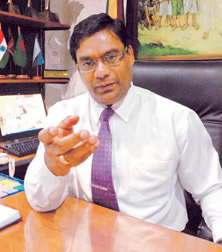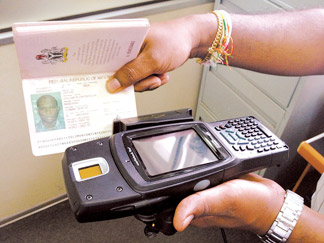Cutting edge technology to fight visa frauds
By K.K. Kariyakarawana
|

Controller Department of Immigration
and Emigration Chulananda Perera
|
The Department of Immigration and Emigration is to adopt a cutting
edge technology to enhance its border control operations in future by
introducing a Mobile Passport Reader (MPR).
The MPR will be used to swipe and scan any passport at any given time
enabling the authority to get a full description of the passport holder
instead of doing it at an immigration or emigration counter at an
airport.
Controller Department of Immigration and Emigration Chulananda Perera
told the Sunday Observer that a single unit which cost around Rs.
700,000 will be put into practice in few weeks time.
The Department has so far purchased eight units from the mobile
technology and security specialist 3M, which had been imported from the
UK.
|

An officer demonstrating how a passport is being scanned through
the mobile reader. |
The new equipment will help to achieve the full life cycle of border
control which is arrival, departure and transfer passengers in no time.
"Earlier we could check a passport of a foreigner only at an
immigration and emigration counter attached to an airport or a shipping
port or the department head office. If a foreigner was nabbed on
suspicion on the street he had to be brought to a nearest department
branch. But because of the new mobile reader you can check the details
of a passport holder anywhere," Controller Perera said.
It enables the department to conduct snap raids at any place
especially popular tourist destinations to do random check ups on
tourists and ascertain their state of visa. This will immensely help to
improve the detections and minimise the number of tourists who overstay.
Tourists visit Sri Lanka for various purposes under various visa
categories like visit visa, tourist visa or student visa. And some
decide to remain in the country although after their permitted period of
visa is expired.
This can become a serious issue and its the department's
responsibility to carry out many detections as possible to apprehend the
culprits and bring them before the law or deport them to their native
countries. With the new unit implementing these constant detections will
be efficient.
The unit which looks like a credit or debit card reader in a common
supermarket at the first glance, contains a comprehensive circuit that
works with data sim. The unit is linked to the department's main system
of the database where you can obtain details of any passport holder who
had entered the country from a legitimate point of entry.
It also has the facility to scan somebody's thumb and get the same
details if that person fails to produce a valid passport at the time of
the check.
The unit will scan the Machine Readable Zone, the two line code of
digits and letters on the picture page of a passport and obtain the
details.
The unit could be used as a mobile phone to make necessary calls and
to connect to the nearest immigration and emigration point. It also has
the ability to recognise internationally enlisted wanted criminals who
might try to enter into the country as well as those who might try to
leave the country whilst their passports being impounded.
The controller said that one of the chief benefits of the mobile
reader is to check the passports of large numbers of tourists especially
disembark at harbours that come from cruise liners. Instead of queuing
up at entry points creating heavy congestions the officers can now check
the passports at random points. |


